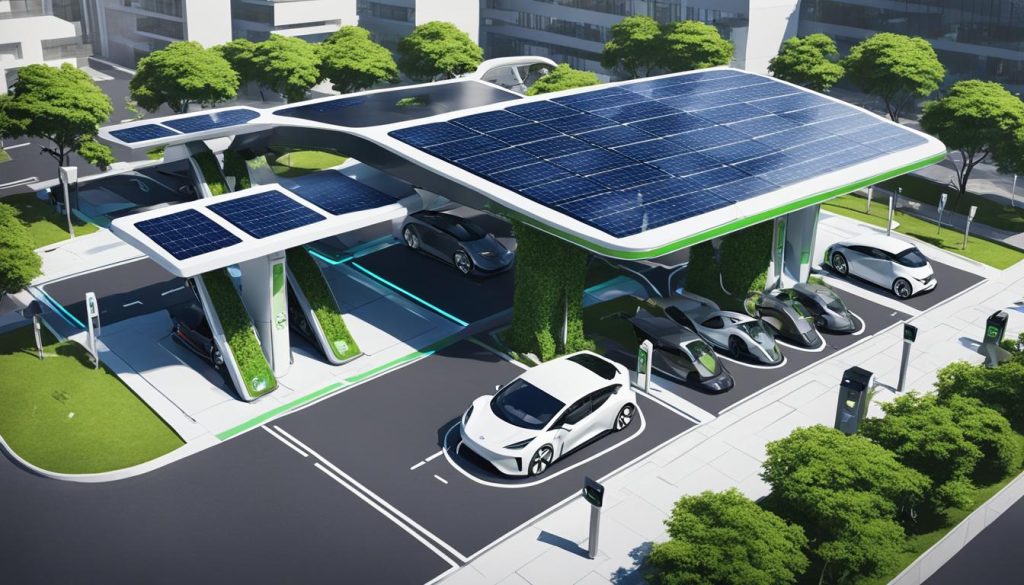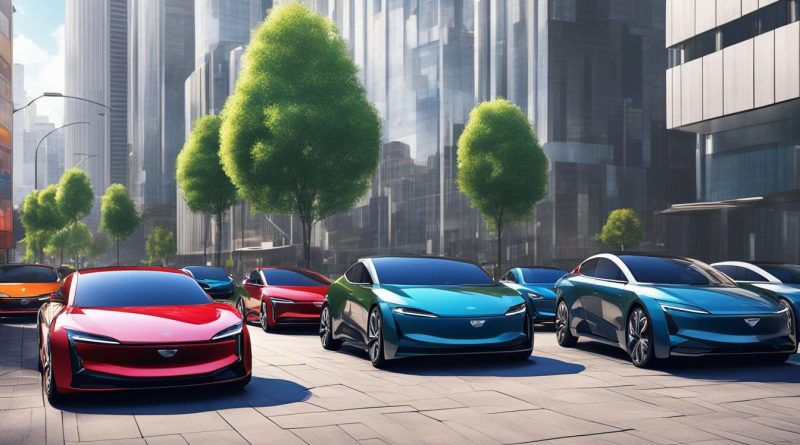Top Electric Vehicles: Best Electric Cars
As environmental concerns continue to grow, more and more people are turning to cleaner, more sustainable modes of transportation. The rise of electric vehicles (EVs) has been a key player in the shift towards eco-friendlier driving.
With a diverse range of models on the market, choosing the best electric car can be overwhelming. Luckily, by considering factors such as performance, features, and benefits, it’s possible to find the perfect EV to meet your needs.
In this article, we explore the top electric vehicles and provide a comprehensive comparison of their key features and performance. We also delve into the latest technological advancements in the industry, offering insights into the future of electric cars.
Key Takeaways:
- The best electric cars combine impressive range, advanced technology, and efficient charging capabilities.
- Factors to consider when choosing an electric car include performance, features, and benefits.
- Electric vehicles are shaping the future of transportation with cutting-edge technological advancements.
- Comparing electric car models and staying informed about the latest advancements is crucial in finding the ideal EV for your lifestyle.
- Contributing to a greener future can be achieved by driving an environmentally-friendly electric car.
Electric Car Models and Comparison
Electric cars are becoming increasingly popular due to their eco-friendliness, cost-effectiveness, and advanced features. With an ever-growing range of electric car models available, it can be challenging to choose the right one that meets your needs. This section provides an in-depth comparison of the most popular electric car models, so you can make an informed decision.
Tesla Model S vs Nissan Leaf
| Features | Tesla Model S | Nissan Leaf |
|---|---|---|
| Battery range | 402 miles | 150 miles |
| Top speed | 200 mph | 90 mph |
| Acceleration (0 to 60 mph) | 2.3 seconds | 7.4 seconds |
| Charging time | 0-100% in 1 hour | 0-80% in 40 minutes |
The Tesla Model S offers superior battery range, top speed, acceleration, and charging time compared to the Nissan Leaf. However, it comes at a higher cost. The Nissan Leaf is a more budget-friendly option with decent performance, making it suitable for city driving and shorter commutes.
Audi e-Tron vs Jaguar I-PACE
| Features | Audi e-Tron | Jaguar I-PACE |
|---|---|---|
| Battery range | 222 miles | 292 miles |
| Top speed | 124 mph | 124 mph |
| Acceleration (0 to 60 mph) | 5.5 seconds | 4.5 seconds |
| Charging time | 0-80% in 45 minutes | 0-80% in 85 minutes |
The Jaguar I-PACE offers a longer battery range and faster acceleration than the Audi e-Tron. However, the e-Tron is more spacious and comfortable. Both models feature impressive performance and luxury features, making them excellent choices for long journeys or daily commutes.
It’s essential to carefully consider the key features and specifications of each electric car model before making a purchase. Ensure you analyze your needs, such as battery range, performance, and budget, to make an informed decision.
Electric Car Reviews: Ranking the Top Performers
When it comes to choosing the best electric car for your needs, it’s critical to consider a range of factors. In this section, we’ll examine in-depth reviews of the top-performing electric cars on the market, analyzing their essential features, reliability, and customer satisfaction ratings. By comparing the different models side by side, you’ll have the knowledge and insights you need to make an informed decision about which electric vehicle to buy.
Tesla Model 3
The Tesla Model 3 is a standout electric car that is known for its impressive range, advanced technology, and sleek design.
| Features | Specifications |
|---|---|
| Range | 263 miles on a single charge (standard battery), 353 miles on a single charge (long-range battery) |
| Acceleration | 0-60 mph in as little as 5.3 seconds |
| Charging Time | 22 miles of range per hour of charging (Tesla wall charger) |
| Customer Satisfaction Rating | 4.5 stars (out of 5) on Edmunds.com |
With a starting price of around £40,000, the Tesla Model 3 is one of the most affordable electric vehicles on the market and offers superior value for money. Its advanced technology and impressive range make it a clear winner in the electric car category.
Jaguar I-PACE
The Jaguar I-PACE is a luxury electric SUV that combines exceptional performance with a luxurious and refined design.
| Features | Specifications |
|---|---|
| Range | 292 miles on a single charge |
| Acceleration | 0-60 mph in 4.5 seconds |
| Charging Time | 80% charge in 40 minutes (DC fast charger) |
| Customer Satisfaction Rating | 4.6 stars (out of 5) on Edmunds.com |
While the Jaguar I-PACE is a bit pricier than some of its electric SUV competitors, it offers superior luxury and performance. Its impressive range, fast charging capabilities, and stylish design make it a standout electric vehicle.
“The Tesla Model 3 and Jaguar I-PACE are top-performing electric cars that offer superior performance, exceptional range, and advanced technology. Whether you’re looking for a luxury electric SUV or an affordable electric sedan, these models have something to offer.”
No electric car review would be complete without also considering other EV models such as the Chevrolet Bolt, Nissan Leaf, and Kia Niro EV. Our comprehensive reviews analyze the performance, features, and suitability of these vehicles for everyday use.
By staying informed and reading electric car reviews, you can make a confident and informed decision about which electric vehicle is right for you.
Electric Car Range and Charging Capabilities
In this section, we explore the latest developments related to electric car range and charging capabilities. The electric car range refers to the maximum distance an electric vehicle can travel on a single charge. With advancements in battery technology, electric car range has increased significantly over the years, providing drivers with greater flexibility and convenience.
According to recent studies, the average range of an electric car falls between 150 and 250 miles on a single charge. However, some premium models offer a longer range of up to 400 miles. It’s important to note that factors like driving speed, road conditions, and climate can affect the electric car range, so it’s essential to plan your trip accordingly.
When it comes to electric car charging, there are different types of charging stations that offer varying levels of power. The most common type of electric car charging is Level 2 charging, which provides an average charging time of 4-8 hours. However, the industry is moving towards faster charging options like DC Fast Charging, which can provide an 80% charge in as little as 30 minutes, making it more convenient for long-distance travel.
It’s also essential to consider the availability of charging stations in your area and along your route. The electric car charging infrastructure is continuously expanding, with more public charging stations being installed every year.

Smart charging technology is also making electric car charging more efficient and cost-effective. With features like scheduled charging and real-time pricing, drivers can optimize their charging times to take advantage of off-peak electricity rates and minimize their carbon footprint.
Electric Car Charging Times Comparison (Level 2 Charging)
| Vehicle Model | Charging Time (0-100%) | Range |
|---|---|---|
| Tesla Model S Long Range Plus | 8 hours | 402 miles |
| Nissan Leaf S Plus | 11 hours | 215 miles |
| Hyundai Kona Electric | 9 hours | 258 miles |
| BMW i3 | 4.5 hours | 153 miles |
As seen in the table, different electric car models have varying charging times and ranges, making it essential to consider your needs and preferences when choosing an electric car. Always refer to the manufacturer’s instructions for the best charging practices to optimize the range and lifespan of your electric car battery.
Overall, electric car range and charging capabilities have come a long way, and with continuous advancements in technology, we can expect even more convenient, efficient, and sustainable solutions in the future.
Electric Car Technology: Innovations and Future Developments
Electric car technology is advancing rapidly, leading to exciting innovations and future developments that enhance the driving experience and sustainability of electric cars. In this section, we explore the latest trends and cutting-edge features that are shaping the future of transportation.
Autonomous Driving Capabilities
The emergence of autonomous driving capabilities is one of the most significant advancements in electric car technology. With the ability to self-navigate, electric vehicles are transforming the way people commute and travel. The latest models incorporate advanced features such as self-parking, traffic jam assist, and lane departure warning systems. These features improve safety and convenience, making electric cars an attractive option for commuters.
“Autonomous driving technology is revolutionizing the way we travel, making driving safer and more efficient.”
Connectivity Features
Electric cars are also becoming increasingly connected, with advanced features that allow drivers to stay connected to their vehicle and the world around them. Features such as remote vehicle control and voice-activated assistance provide a seamless experience for drivers, while wireless software updates ensure that electric cars are always up to date and performing optimally.
Battery Technology
Battery technology is a critical component of electric car technology, and recent innovations have led to significant improvements in battery life and efficiency. The latest electric cars can travel further on a single charge than ever before, making them a practical alternative to traditional gas-powered vehicles. Furthermore, improvements in battery technology have led to faster charging times, making electric vehicles more convenient for daily use.
Smart Charging and Infrastructure
One of the main concerns for electric vehicle owners is finding charging stations during long journeys. With the growth of electric car infrastructure, however, this is becoming less of a challenge. Smart charging solutions that optimize charging times and reduce energy costs are also emerging, making electric cars more accessible and affordable. The combination of advances in battery technology and charging infrastructure means that electric cars are now a practical and sustainable option for drivers.
Stay informed about the latest advancements in electric car technology, and discover how these innovations are shaping the future of transportation. With autonomous driving capabilities, advanced connectivity features, and improvements in battery technology and infrastructure, the electric car industry is rapidly advancing towards a sustainable and efficient future.
Conclusion
The world of electric cars has undergone significant changes, and as we move towards a greener future, the popularity of EVs continues to grow. As highlighted in this article, the best electric cars available today offer impressive ranges, advanced technology, and efficient charging capabilities. Consumers now have a wide range of electric car models to choose from, including sedans, SUVs, and hatchbacks.
By considering the different electric car models and comparing their features and specifications, environmentally-conscious drivers can make informed decisions about the most suitable electric vehicle for their needs. It’s also essential to stay updated with the latest technological advancements, such as autonomous driving capabilities and advanced connectivity features that are shaping the future of the electric car industry.
Overall, electric cars offer a sustainable alternative to traditional gasoline cars, reducing carbon emissions and contributing to a cleaner environment. By embracing the latest technological innovations and developing more efficient charging infrastructure, electric cars are becoming increasingly attractive options for drivers around the world.
FAQ
What are the best electric cars currently available?
The best electric cars currently available include the Tesla Model 3, Nissan Leaf, and Chevrolet Bolt. These vehicles offer impressive performance, long-range capabilities, and advanced features.
How do electric car models compare to each other?
Electric car models can vary in terms of range, acceleration, charging options, and price. Comparing electric car models allows you to determine which vehicle best meets your specific needs and preferences.
Where can I find detailed reviews of electric cars?
Detailed reviews of electric cars can be found on reputable automotive websites, such as Car and Driver, Motor Trend, and Edmunds. These reviews provide comprehensive insights into the performance, features, and overall user experience of different electric car models.
How far can electric cars travel on a single charge?
The range of electric cars varies depending on the model and battery capacity. Most electric cars can travel between 100 and 300 miles on a single charge, with some high-end models offering over 400 miles of range.
How long does it take to charge an electric car?
The charging time for an electric car depends on the charging infrastructure and the vehicle itself. Home charging stations typically take several hours to fully charge an electric car battery, while public fast-charging stations can provide up to 80% charge in around 30 minutes.
What are the latest advancements in electric car technology?
The latest advancements in electric car technology include autonomous driving features, enhanced connectivity options, and improved battery efficiency. Electric car manufacturers are continuously innovating to provide safer, more efficient, and environmentally friendly driving experiences.




